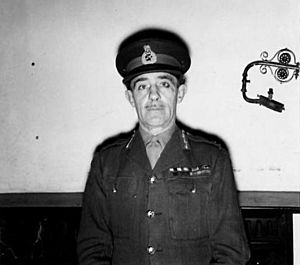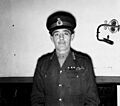Horatio Berney-Ficklin facts for kids
Quick facts for kids
Horatio Berney-Ficklin
|
|
|---|---|

Major General Horatio Berney-Ficklin, pictured here in January 1942 during the Second World War.
|
|
| Born | 13 June 1892 Cavendish Square, London, England |
| Died | 17 February 1961 (aged 68) Cape Town, South Africa |
| Allegiance | United Kingdom |
| Service/ |
British Army |
| Years of service | 1912–1948 |
| Rank | Major General |
| Service number | 21164 |
| Unit | Norfolk Regiment Highland Light Infantry |
| Commands held | 55th (West Lancashire) Infantry Division 48th Infantry (Reserve) Division 5th Infantry Division 15th Infantry Brigade 2nd Battalion, Highland Light Infantry 5th Battalion, Norfolk Regiment |
| Battles/wars | First World War Russian Civil War Arab revolt in Palestine Second World War |
| Awards | Companion of the Order of the Bath Military Cross Mentioned in Despatches (2) |
Horatio Berney-Ficklin was a brave British Army officer. He served in both the First World War and the Second World War. During World War II, he led the 5th Infantry Division. This division was known as "The Globe Trotters" because it traveled so much. He commanded them for over three years, from 1940 to 1943.
Contents
Early Life and Joining the Army
Horatio Berney-Ficklin was born in London, England, on June 13, 1892. He went to Rugby School and then Jesus College, Cambridge. After finishing school, he joined the army. He became a second lieutenant in the Royal Norfolk Regiment in 1912.
In June 1914, he joined the 1st Battalion, Norfolk Regiment. This was just before the First World War began.
World War I Service
When the war started, Horatio quickly moved up in rank. He became a temporary lieutenant and then a temporary captain. He joined the 8th (Service) Battalion, Norfolk Regiment. This battalion was part of Kitchener's Army, which was made up of many new volunteers.
In July 1915, his battalion went to the Western Front in France. This was where much of the fighting happened. Horatio was recognized for his bravery and received the Military Cross in 1916. He was promoted to temporary major on the first day of the Battle of the Somme. His division played a big part in this important battle.
Later, he became a brigade major in the 51st (Highland) Division. In March 1918, during a big German attack, Horatio was injured. He was taken as a prisoner of war.
Between the World Wars
After World War I ended in 1919, Horatio was released. He stayed in the army and was sent to Russia. He worked as a liaison officer during the Russian Civil War, where he was wounded again.
He continued to serve in different roles. In 1929, he became a lieutenant colonel and took command of the 5th Battalion, Norfolk Regiment. In 1932, he moved to the Highland Light Infantry.
In 1936, he became the Commanding Officer (CO) of the 2nd Battalion of his new regiment. They were serving in India at the time. Later, his battalion moved to Palestine. They were there during the Arab revolt. For his service in Palestine, he was mentioned in official reports.
In 1939, Horatio returned to England. He was promoted to brigadier and colonel. He was given command of the 15th Infantry Brigade. This brigade was part of the 5th Infantry Division.
Second World War Service
Shortly after the Second World War began in September 1939, Horatio's brigade went to France. They were part of the British Expeditionary Force (BEF). The first few months were quiet, a time known as the "Phoney War".
Fighting in Norway
In April 1940, his brigade was sent to Norway. The Germans had invaded Norway, and British forces were sent to help. Horatio was chosen to lead the British troops trying to capture Trondheim. However, his plane crashed on the way, and he was injured. He could not take command. His brigade fought bravely in Norway, but suffered many losses. Horatio was later mentioned in official reports for his service.
Leading the 5th Infantry Division
After recovering, Horatio was promoted to major general in July 1940. He became the leader of the 5th Infantry Division. He would command this division for the next three years. This made him one of the longest-serving British divisional commanders of the war.
The division spent the rest of 1940 getting ready for battle. They trained and received many new soldiers. In 1941, they moved to Northern Ireland to help protect against a possible German invasion.
Overseas Missions
In early 1942, the division left England. They were sent to India. At this time, the Japanese had entered the war and were winning many battles. India needed more troops.
On their way, the division stopped in South Africa. They then crossed the Indian Ocean. Some of their brigades were sent to Madagascar for an invasion there. The rest of the division arrived in India in May.
Later, the division was sent to Persia (modern-day Iran). There was a fear that the German Army might break through the Eastern Front and invade Persia. The 5th Division helped protect the area. Horatio was awarded the Order of the Bath on his 50th birthday in June 1942.
The German defeat at Stalingrad in February 1943 removed the threat to Persia. The division then trained for landings from the sea and mountain warfare in the Middle East. They became part of the British Eighth Army, a famous fighting force.
Invasion of Sicily
On July 10, 1943, Horatio's 5th Division landed on Sicily. This was part of Operation Husky, the Allied invasion of the island. They were among the first British troops to land in Europe in over three years.
His division quickly captured Syracuse and Augusta. As they moved towards Messina, they faced strong German resistance. However, on August 3, Horatio was replaced as commander. He returned to England. Even though he was a popular leader, his performance in Sicily did not fully impress his commanders. He was mentioned in official reports again for his service in Persia and Iraq.
Back in England, Horatio took command of the 48th Infantry (Reserve) Division. This division was responsible for training new soldiers. In 1944, he then became the leader of the 55th (West Lancashire) Infantry Division. This division stayed in the United Kingdom throughout the war.
After the War
After the war ended, Horatio Berney-Ficklin led a British Military Tribunal. This court was held in Germany in 1945. It was set up to try people suspected of war crimes from the Bergen-Belsen concentration camp.
He retired from the army in 1948 due to a disability. He moved to Cape Town, South Africa, where he passed away on February 17, 1961, at the age of 68.
Images for kids
 | Shirley Ann Jackson |
 | Garett Morgan |
 | J. Ernest Wilkins Jr. |
 | Elijah McCoy |


